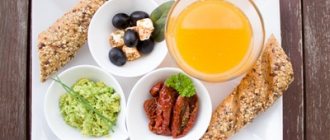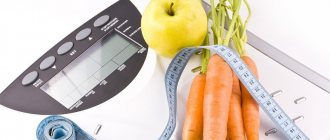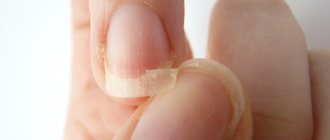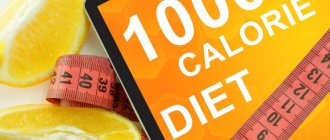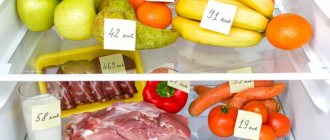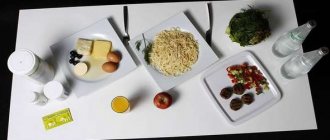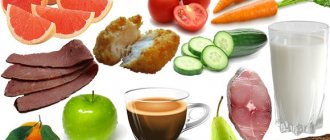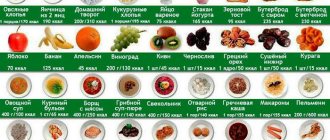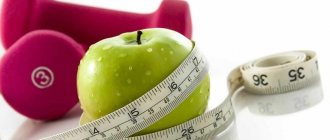11614
A menu of 2500 calories per day should be followed by people who actively visit the fitness room. A balanced diet helps increase muscle mass. If you follow this diet, there is no negative effect on the organs of the digestive tract.
A 2,500 calorie per day menu provides the body with vitamins and nutrients. This diet is not recommended for people taking medications to lower blood sugar.
Sample diet for men
If a representative of the stronger sex engages in strength training or jogging, he should pay attention to the menu listed below for 2500 calories per day (excluding protein supplements). If desired, you can additionally introduce fish or dietary meat into your diet. Porridges are alternated with pasta, which is made from durum wheat. It is recommended to put vegetable oil or butter in dishes.
A sample menu for 2500 calories per day is as follows:
- Breakfast – a few slices of coarse bread, 200 grams of cottage cheese, 2 eggs, ½ serving of porridge cooked in milk;
- 2nd breakfast – 1 apple, 150 ml of unsweetened medium fat yogurt;
- Afternoon snack – 0.15 kg of cottage cheese, 150 ml of milk, 0.15 kg of milk porridge;
- Dinner – 200 grams of cottage cheese, 100 grams of black bread, a little low-fat milk. About 1-2 hours before bedtime, it is recommended to drink 200 ml of milk.
In between meals, you should eat protein shakes. In most cases, they are made at the rate of 40 grams of finished powder per 0.2 liter of liquid (milk or water).
Men who want to build muscle quickly can use the 2,500 calorie per day menu below.
If desired, you can adjust the menu by replacing the protein shake with a full meal. Instead of bread, you can eat buns that contain bran. Rice and potatoes may be replaced with pasta (made from durum wheat).
An approximate menu is presented in the corresponding table.
| Eating | Approximate diet |
| 1 breakfast | A serving of omelette, 50 grams of cheese, some toasted bran bread, a small amount of fresh fruit |
| 2 breakfast | 200 ml protein shake prepared with milk |
| Dinner | A serving of soup, several sandwiches with boiled fish or meat, milk, special nutritional supplements |
| Afternoon snack | Protein cocktail |
| Dinner | A portion of oven-baked potatoes, veal, salad made from fresh vegetables, nutritional supplements. Before going to bed, it is recommended to eat 2 slices of ham, some nuts or cheese |
Be sure to read: The benefits of five meals a day and a weekly menu for weight loss
The essence of the diet
Sports and a healthy lifestyle sometimes do not bring positive results in gaining muscle mass. Sports supplements and anabolic steroids cause irreparable harm to health. The 2500 calorie per day diet is a sports nutrition diet aimed at accelerating the process of positive athletic performance.
The diet was optimized for athletes, but has now gained popularity among those who want to balance their diet. The basis of 2500 calorie sports nutrition is protein.
Benefits of dietary nutrition:
- Price;
- No load on the digestive tract;
- Consumption of nutrients and vitamins;
- Clear power characteristics;
- Ease of use.
The 2500 calorie per day diet is suitable not only for sports enthusiasts, but also for patients with diabetes, with the addition of glucose-lowering oral medications to the diet.
Protein shakes
An oat protein shake is prepared as follows:
- You need to take about 20 grams of finely ground oatmeal.
- Add 200 ml of warm milk, ½ part of an apple, 10 grams of low-fat cottage cheese.
- If desired, you can add a little honey additionally.
- The resulting mass is thoroughly mixed and blended using a blender. This hearty and tasty protein shake is recommended for breakfast.
This drink can provoke rapid weight gain during active physical activity.
Be sure to read: Established norms of indicators in tables of height and weight of children
A protein shake that satisfies hunger is prepared from the following products:
- 500 ml milk;
- 1 fresh banana;
- 30 grams of nuts;
- 3 tablespoons honey;
- 50 grams of cottage cheese.
The above ingredients are placed in a blender bowl. They need to be beaten for two minutes. After this, the protein shake is poured into separate glasses. The drink is consumed twice a day.
Who Should Follow a 3,000 Calorie Diet?
Your daily calorie needs are based on several factors, including:
- Floor . Women typically burn 5–10% fewer calories at rest than men of the same height (1).
- Age . The number of calories you burn at rest decreases as you age (2).
- Height . The taller you are, the more calories you need to maintain your weight.
- Physical activity . Physical activity, such as yard work and sports, increases caloric needs (3).
Daily caloric needs range from 1,600–2,400 calories per day for adult women to 2,000–3,000 calories per day for adult men, with the lower end of the ranges being for sedentary individuals and the upper end for active individuals (4).
These estimates are based on equations using average heights and healthy weights for adult women and men. The 163 cm tall reference woman weighs 57.3 kg, while the 178 cm tall reference woman weighs 70 kg.
Depending on your body size and level of physical activity, you may need 3,000 calories or more per day to maintain your weight.
Although athletes generally have higher caloric needs than the general population, people with physically demanding jobs, such as farm workers and construction workers, may also need large amounts of calories to maintain their weight.
Conversely, if you do moderate-intensity exercise a few days a week and are sedentary in between workouts, you probably won't need as many calories, since exercise burns far fewer calories than most people realize (5, 6, 7)
Summary:
Factors such as gender, age, height and physical activity level influence whether you should stick to a 3,000-calorie-a-day diet.
Additional recommendations for people over 40 years of age
When creating a menu for 2500 calories per day for people over 40 years old, you must be guided by the following principles:
- After reaching the age of forty, vulnerability to various adverse factors increases. An unhealthy diet can impair the functioning of the endocrine, cardiovascular and nervous systems. If a person has gastritis, errors in diet often lead to the occurrence of cancer. This is due, first of all, to the fact that immunity noticeably weakens with age. After 40 years, metabolic processes slow down - to maintain a figure in good shape, you need to carefully monitor the caloric content of your diet.
- It is recommended to eat frequently and in small portions (about 5 times a day).
- After reaching the age of forty, the ability to absorb fat deteriorates. You should limit your consumption of confectionery products, fatty meat dishes, and baked goods as much as possible;
The recommended daily protein intake for people over the age of forty is 100 grams. Foods rich in methionine are especially beneficial for the body. Thanks to this amino acid, lipotropic substances are formed in the body, helping to normalize lipid metabolism and regulate cholesterol levels in the body.
- Foods such as feta cheese, kefir, and cottage cheese are rich in methionine. In addition to an important amino acid for the body, such products contain quite a lot of calcium.
- The diet includes oatmeal, buckwheat dishes, and rice porridge. Such products do not allow toxic substances to linger in the body.
- It is recommended to cook food in a steamer or oven.
- People over 40 years old, following a diet of 2500 calories per day, should eat seaweed, prunes, fresh vegetables and fruits.
- It is recommended to drink at least two liters of fluid per day. The consumption of strong coffee should be reduced. Preference is given to plain water and teas made from medicinal plants. For example, mint leaves contain: ascorbic acid, flavonoids, folic acid, potassium, menthol, calcium, and essential oils. The medicinal plant helps eliminate anxiety and promotes muscle relaxation. Mint is known for its pronounced sedative properties.
Grocery list
Average nutrient intake for an adult based on 2,500 calories per day:
- Cholesterol – no more than 300 mg;
- Fats – no more than 25 g, of which saturated fats – no more than 25 g;
- Dietary fiber – no more than 25 g;
- Carbohydrates – from 257 g to 586 g;
- Proteins – from 58 g to 117 g.
The diet involves consuming:
- Vegetables and fruits;
- Spices and herbs;
- Vegetable fats and oils;
- Soups, sauces and gravies with the addition of chicken, fish or beef;
- Nuts and seeds;
- Bobov;
- Pasta;
- Sokov;
- Eggs and dairy products;
- Bakery products;
- Honey and sugar.
Before using dietary supplements, you should consult your doctor. Replace products with similar ones if you are individually intolerant to the components.
Nutrition Principles for Gaining Muscle
When planning a diet, you should follow four basic principles. They will help you create the right diet for successful and quick muscle gain. Please take into account:
- Frequency of meals.
- Water balance.
- Balance of carbohydrates, fats and proteins.
- Calorie content of food.
Meal frequency
The growth of muscle mass becomes possible only if the body receives a sufficient amount of calories, that is, it does not experience an energy deficit. Muscle tissue needs building material on the basis of which they can recover and show growth.
It is extremely important that the body receives nutrients (fats, carbohydrates and proteins) in the correct proportions. It is important to maintain not only proportions, but also time. If the body does not receive the next portion of food by a certain date, the muscles will stop growing. Accordingly, you should adhere to a certain frequency of meals.
Water balance
It is important that the body does not experience any lack of water. If there is not enough water, the process of gaining muscle mass will seriously slow down. The daily norm is 2-4 liters, provided that training occurs regularly, and depends on the weight of the athlete. For example, if you weigh 100 kg, you need to drink 4 liters of water daily.
I will add that drinking water during meals is not recommended, as it begins to interfere with the digestion process, prolonging it over time. It is better to drink between meals.
Nutrient balance
The correct ratio between proteins, fats and carbohydrates allows you to build an effective diet. The following proportions must be observed:
- 30-35% of the diet should be proteins - 2.6 g per kg of weight.
- 10-20% is occupied by fats (sea fish, fish oil, walnuts, polyunsaturated acids are a good source) - 1 g per kg of weight.
- 50-60% of the menu should be carbohydrates - 4 g per kg of weight.
The indicated data on BZH norms are valid for men weighing approximately 80 kg. The exact indicators depend on the individual characteristics of the athlete.
Calorie content of food
When planning a diet, you must be clear about how many calories you need to consume per day to ensure muscle growth. The daily norm is calculated individually. Not all calories are spent on gaining muscle mass, from which we can conclude that food must be sufficiently high in calories.
If the body consumes all its energy to maintain vital functions, there will be little left for muscle tissue. Don't worry about the fact that unspent calories may be deposited on your stomach and sides. Properly organized workouts will help you get your body in order.
Menu for every day
The 2500 calorie per day diet involves eating smaller meals. Diet increases the load on the liver, so drinking alcohol is not recommended. It is necessary to consume only organic products. Avoid canned and processed foods, which can cause fat growth.
Breakfast 8:30 am
- 2 boiled eggs;
- 1/2 cup oatmeal or other grains;
- 1/2 cup skim milk with half a teaspoon of flaxseed oil or sunflower oil;
- 1 orange.
Second breakfast 11:30 am (two hours before training)
- 150 grams of tuna or turkey with mixed vegetable salad, seasoned with a tablespoon of low-calorie mayonnaise;
- a slice of black bread;
- 1 banana;
- 6 pieces of almonds;
- 1 tbsp juice.
Lunch 2:30 pm (immediately after finishing training)
- 150 grams of chicken breast meat;
- 3/4 cup chicken rice, pasta or vegetables;
- 1/4 sweet pepper;
- 100 grams of lightly stewed mushrooms;
- 100 grams of chopped carrots;
- Add 1 tablespoon of olive oil to one of the dishes.
Light evening snack 5:00 – 5:30
- 1 low fat yogurt;
- 100 grams of boiled oatmeal.
Dinner 8:30 – 9:00 pm
- 1 chicken breast fillet with salad, dressed with 1 tablespoon of low-calorie mayonnaise;
- 1 slice of bread.
Eating one hour before bed, approximately 11:00 p.m.
- 20 grams of cheese;
- 1 tbsp peanut butter;
- 1/2 cup rolled oats (measured raw or dried);
- 10 pieces of almonds or other nuts;
- 150 grams of vegetables.
Dish recipes
Bean soup
You will need: 0.1 kg of green peas, 1 large onion, 0.5 kg of chickpeas, 2 medium carrots, 20 g of vegetable oil, ground black pepper, salt, 1 tsp of soda.
Cooking method:
In the evening, pour cool water over the beans and leave overnight. The next day, drain the water and mix with the required amount of soda, leave to soak for several hours. Rinse thoroughly with running water. Pour plenty of water over the beans and place over medium heat. Skim off the foam and add chopped onions, carrots, peas and butter. Add salt and pepper to taste. Cook until done.
Krupenik
You will need: boiled buckwheat or wheat porridge 180 g, sour cream 5 g, sugar 10 g, crackers 5 g, cottage cheese 85 g, egg 1/4 pcs, melted butter 5 g.
Cooking method:
Add cottage cheese, salt, eggs, sugar, butter to the prepared porridge and mix. Place the resulting mass on baking sheets and grease the surface with sour cream. Bake until done.
Potato salad
You will need: 0.5 kg of potatoes, 1 tbsp horseradish, 1 ripe apple, 2 tbsp vinegar, 0.1 kg ham, 2 tbsp vegetable oil, 0.1 kg leeks, 1 tbsp honey, 2 celery roots, salt and pepper.
Cooking method:
Cut potatoes, leeks, celery and apple into small cubes. Mix oil, vinegar, honey and horseradish, add salt and pepper. Pour the resulting sauce over the vegetable salad and leave for 2 hours. Roll the ham into rosettes and decorate the surface of the salad.
Barley porridge
You will need: 2 tbsp butter, 3 eggs, 1 tbsp barley, 1 tbsp sour cream, salt, 1 l milk.
Cooking method:
Pour hot milk over the washed cereal, bring to a boil and reduce heat. Add butter, sour cream and salt to taste to the boiled cereal. Add eggs to hot porridge and stir. Transfer the porridge to a frying pan or mold. Bake at 150 C for about 15 – 20 minutes.
In between meals, perhaps drink protein shakes.
One serving of the shake contains forty grams of additional protein. To prepare the drink, add 4 tablespoons of powder to a glass of water or milk.
THESE ARTICLES WILL HELP YOU LOSE WEIGHT
Your feedback on the article:
Loading…
Weekly menu for gaining muscle mass
Nutrition for muscle growth must be complete, high-quality, fractional. The diet consists of 3 main meals and 2 snacks.
Features of the menu for weight gain:
- Calorie content – 3000 kcal.
- Water – 3 liters/day.
- Avoid sweets.
An approximate menu option is presented in the table:
| Day of the week | Menu |
| Monday | Breakfast: oatmeal with apples, nuts, toast with cheese, tea. Snack: dried fruits. Lunch: chicken fillet, potatoes, vegetable salad, bread, butter. Afternoon snack: banana, cottage cheese. Dinner: baked salmon, rice, vegetable plate. 30 minutes before bedtime: kefir. |
| Tuesday | Breakfast: Buckwheat porridge with fruits, almonds, milk, bread. Snack: cottage cheese, sour cream, honey. Lunch: cabbage soup with beef, mackerel, baked with vegetables. Afternoon snack: homemade yogurt, bread. Dinner: boiled chicken breast, potatoes, vegetables. 30 minutes before bedtime: kefir. |
| Wednesday | Breakfast: rice milk porridge, 6 egg omelette. Snack: yogurt, raspberries. Lunch: stewed turkey fillet, durum pasta, butter, tomatoes. Afternoon snack: toast with cheese, cottage cheese with jam. Dinner: river trout, brown rice, vegetable salad, sour cream. 30 minutes before bedtime: milk. |
| Thursday | Breakfast: omelette, chicken fillet, steamed vegetables. Snack: smoothie made from milk, banana, strawberries, peanuts. Lunch: boiled veal, grilled vegetables, potatoes. Afternoon snack: salmon sandwich, tomato juice. Dinner: vegetable stew, flounder, peppers, cucumbers. 30 minutes before bed: yogurt. |
| Friday | Breakfast: milk pasta soup, eggs - 2 pcs, cheese, bread, butter. Snack: milkshake, cottage cheese. Lunch: borscht with beef broth, beef, sautéed vegetables, buckwheat. Afternoon snack: nuts, dried fruits, banana. Dinner: mackerel, potatoes, sliced vegetables. 30 minutes before bedtime: kefir. |
| Saturday | Breakfast: oatmeal, milk, banana, strawberries, bread. Snack: cheesecake, homemade yogurt. Lunch: solyanka, vegetables baked with chicken, bread. Afternoon snack: milk smoothie, cottage cheese. Dinner: rice, baked salmon, vegetable salad. 30 minutes before bedtime: kefir. |
| Sunday | Breakfast: buckwheat porridge, omelette, bread. Snack: cottage cheese casserole. Lunch: vegetable soup, veal, pasta, cucumber. Afternoon snack: cottage cheese, jam, kiwi. Dinner: rice, chicken breast, steamed beets. 30 minutes before bed: homemade yogurt. |
Why is protein so important and where to get it?
Protein is a building material for muscles. During intense training, you cannot do without it - the greater the muscle mass, the more protein it needs.
Plant cells contain lentils, peas and soybeans; animals - cottage cheese and milk. These products should be on your menu every day.
Beginners in bodybuilding often begin to abuse ready-made powder cocktails. However, this is not an absolute requirement for gaining muscle mass. They are most effective if you know that after training there will be no time for a full meal.
Basic diet rules for gaining muscle mass
During intense training and physical activity, a significant portion of energy is consumed. Costs are covered with food. By limiting your diet, a person will not receive enough substances necessary for weight gain.
The weight gain diet is based on one principle: you need to get more calories from food than you burn. Only by following this rule can you really achieve positive results.
You should also take into account the following several equally important menu rules for weight gain:
- Eat small meals. You need to eat 5-6 times a day. Portions are small. When eating a significant amount of food at one time, the body will not be able to digest all the nutrients. Some vitamins and minerals will be lost, and the muscles will not receive the required amount of energy on time. The rest of the nutrients will be stored in fat deposits.
- There are high-calorie foods. You should eat frequently, high-calorie foods - 70% of the daily diet. If you eat low-calorie foods, your body will not have enough energy. You will have to increase the number of meals, and the digestive organs will be overloaded.
- Limit the consumption of fast carbohydrates and fats. Consumption of such foods leads to an increase in body fat. Fast carbohydrates are flour products, sweets, baked goods, and candies. The calorie content of the food is high and is absorbed instantly. The body does not have time to quickly waste the energy received. Humans need animal fats in limited quantities. Lard and sausages consumed in excess contribute to an increase in fat deposits.
- Consume 2.5-3 liters of water per day. Rapid weight gain is stressful for the body. Accelerated metabolism and increased metabolism require large amounts of fluid. Lack of water will cause disruption of the digestive tract and worsen overall health. Also, with dehydration, muscles will stop growing.
- Receive 70% of calories before 16:00. Afterwards, eat proteins - cottage cheese, eggs, fish. Fast carbohydrates and fats are eaten before 12:00 and are acceptable before training.
- Diet of athletes. Professional athletes eat 2 hours before exercise and 1 hour after. You should eat as well. Constant training and an enhanced diet will accelerate the process of muscle growth.
- Compliance with the principle of the “food pyramid”: 60% – carbohydrates, proteins – 30%, fats – 10%. Most of the carbohydrates consumed are cereals, potatoes, and fruits. Proteins can be obtained from sports nutrition containing protein in the required quantities. Fats – vegetable, animal – in minimal quantities.
The Best Foods for Gaining Muscle
An increase in muscle mass is associated with the frequency of meals, caloric content and quality of foods consumed. You cannot save money; an unbalanced diet will have a detrimental effect on the condition of the body as a whole.
Recommended to use:
- Beef is rich in iron, keratin, and protein. Ideal – 200 grams per day, 2 times 100 g.
- Chicken fillet, breast. 300 grams contain 69 g of protein, i.e. half the daily requirement. Use 2-3 times a day in portions.
- Salmon contains protein and amino acids. Promotes recovery after training, reduces muscle inflammation, helps monitor testosterone levels.
- Eggs . When gaining weight, they are second only to a protein shake. Protein is instantly absorbed, breaking down into amino acids. To create a balance between proteins and fats, you need to remove 4 yolks from 6 eggs. This omelet will give the body up to 30 grams of protein.
- Nuts . Mono fats increase the performance of the heart, internal organs, and ligaments. You need to eat about 55-60 grams of various nuts per day: almonds;
- walnuts;
- peanut;
- hazelnut;
- cashew nuts.
- potassium;
